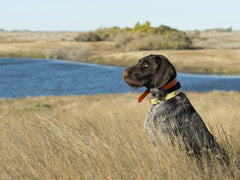How to Choose a Hunting Dog
 There is no relationship more important to the upland sportsman (well, almost) than that between the hunter and their dog. A high-quality, well-trained gun dog will not only contribute to better, more productive hunts, but the care and training of that dog brings rewards as well, extending the upland experience well beyond the field as the dog becomes a part of your daily life.
There is no relationship more important to the upland sportsman (well, almost) than that between the hunter and their dog. A high-quality, well-trained gun dog will not only contribute to better, more productive hunts, but the care and training of that dog brings rewards as well, extending the upland experience well beyond the field as the dog becomes a part of your daily life.
But not all hunting dogs are created equal.
This is a lifetime commitment for the dog, often lasting a decade or more, so it is critical to choose carefully when shopping for a new gun dog. Given that reality, it’s important to start out the process with a very clear understanding of what you need, what you want, and what your new dog can do.
For those new to the sport, it’s often a surprise just how much research goes into choosing a new companion, including everything from bloodlines, to kennels, to breeders. In fact, the general consensus is that 90% of your effort should go toward this behind-the-scenes information, while only 10% should be spent on choosing the individual puppy that works for you.
Writes Bob West in Field & Stream: “I always advise prospective puppy buyers to step way back and ask themselves some pretty basic questions: Is this going to be a house dog or an ‘outside’ dog? Do I want a small dog, a large dog, or something in-between? Do I intend to hunt waterfowl, upland birds, or a combination of both? Will I be better served by a pointing breed, a flushing breed, or a retrieving breed? Once you’ve determined the answers to these questions, you’ll be in position to zero in on the breed that makes the most sense for you.”
Considering the breed
The many different breeds of hunting dogs each bring their own strengths to the table, as each was traditionally bred to improve a specific quality or skill. For example, the Boykin Spaniel is known as a flusher, while its cousin the Brittany is more of a pointer. Retrieving breeds specialize, not surprisingly, in retrieval, while other breeds are known for a combination of these skills.
[For an overview of many of the different breeds, Pheasants Forever offers a nice list of the options here.]
But keep in mind that these are animals, not machines. There will still be a fair amount of variation within each breed, so the role of the individual breeder is critical. Do your research and find a breeder who specializes in the type of dog that you need.
Finding “the one”
With this research in hand, it becomes a step-by-step process by which smart buyers are able to effectively guarantee they end up with a strong, quality hunting dog.
Choose the breed: What types of skills do you need in a dog? What is your own personal hunting style? Do you need a dog to flush out birds for you or do you prefer one that simply points out the prey and retrieves after the shot? What types of birds do you like to hunt? What sort of terrain do you usually visit?
Choose the breeder: As mentioned, different breeders specialize in different types of dogs. What is their track record in breeding the type of hunting dog that you need?
Choose the litter: By the time you get to the stage of actually looking at puppies, the experts say that you should already be committed to a particular litter. The breed and bloodline both need to make sense for producing the kind of dog that’s right for you, the birds you like to hunt, and the way you like to hunt before you can make an informed decision. From there, it is simply a matter of…
Choose the puppy: Never believe anyone who tells you that they can objectively walk into a kennel and choose the right puppy without a game plan. Once you’re surrounded by all of those floppy ears and wagging tails, even the best of us will want to take them all home. The good news is that, as long as you’ve done your research in advance and chosen a breeder and a litter with a strong bloodline, it’s hard to screw up at this point. Still, don’t overlook considerations such as individual health and temperament when making the final decision.
What do you think? How do you choose your own gun dogs? What factors matter the most to you?
